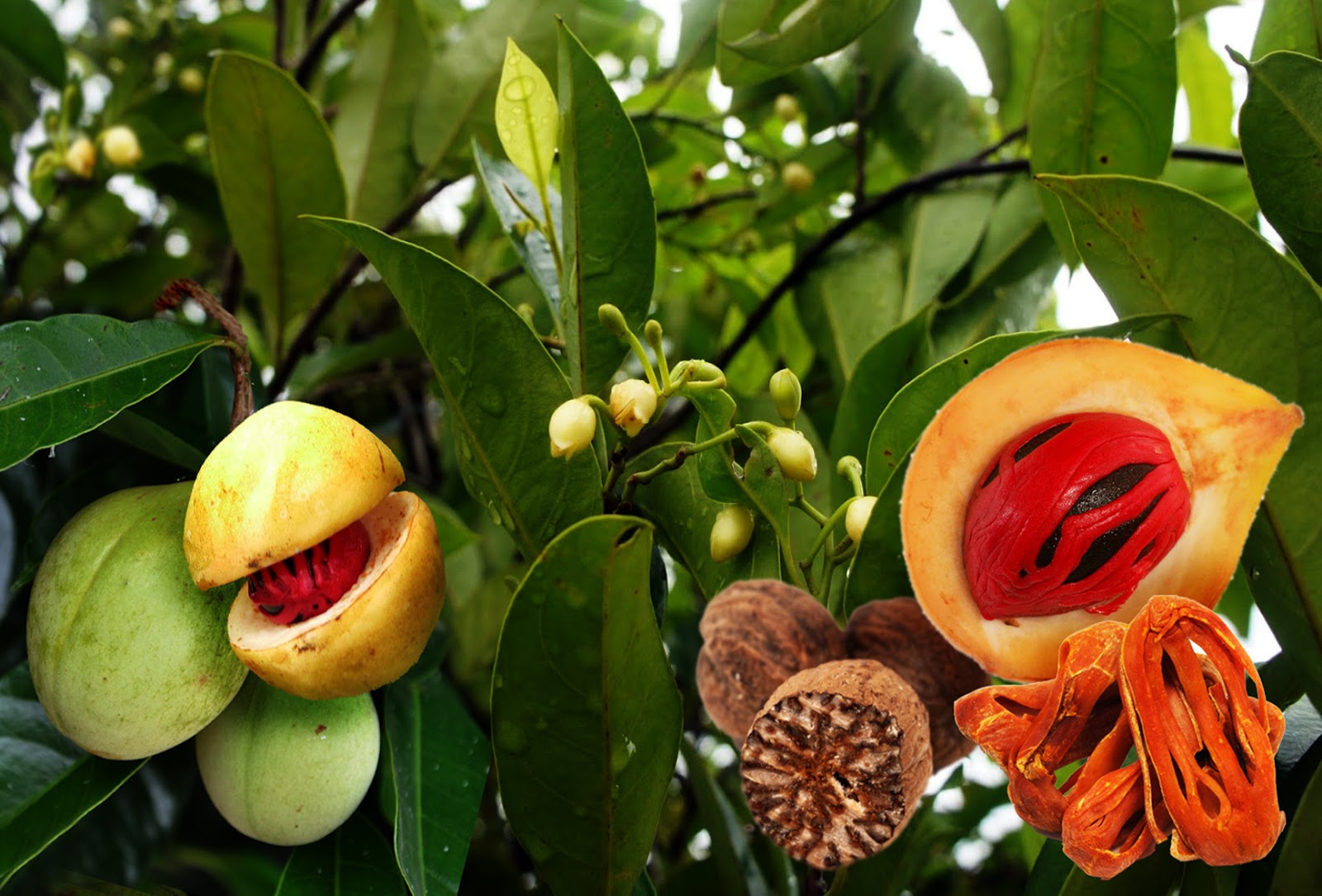Pleasantly aromatic, nutmeg is actually a seed (kernel) of the fruit from the Myristica fragrans tree. It is one of the highly prized spices known since antiquity for its aromatic, aphrodisiac, and curative properties. Nutmegs are evergreen trees, native to the rainforest of Indonesian Moluccas Island, also known as the Spice Islands. Nutmeg is used to enhance the flavors in many savoury dishes.
This article tells you everything you need to know about nutmeg.
Where Did Nutmeg Come From?
A native to Banda Islands, in the Moluccas of Indonesia or Spice Islands, and the Malay Archipelago, nutmeg is believed to be in existence as early as during the first century. Today, it is produced in many places including Malaysia, various Caribbean islands, New Guinea, and Sri Lanka. About 10,000 tons a year is produced and mainly used in the US, Japan, Europe and India.
Description Of Nutmeg
The nutmeg seed is encased in a mottled yellow, edible fruit, the approximate size and shape of a small peach. The fruit splits in half to reveal a net-like, bright red covering over the seed. This is the aril which is collected, dried and sold as mace. Under the aril is a dark shiny nut-like pit, and inside that is the oval shaped seed which is the nutmeg. Nutmegs are usually sold without the mace or hard shell. They are oval, about 25 mm (1 in) in length, lightly wrinkled and dark brown on the outside, lighter brown on the inside.
Nutrition Facts Of Nutmeg
Nutmeg has a nutritive content of vitamins, minerals, and organic compounds related to essential oils. According to the USDA National Nutrient Database, these beneficial components include dietary fiber, manganese, thiamin, vitamin B6, folate, magnesium, copper, and macelignan.
8 Outstanding Healthy Benefits Of Nutmeg
- Relieves Pain – People suffering from chronic conditions like cancer, inflammatory diseases, and diabetes often suffer from persistent pain. According to the National Center for Biotechnology Information, U.S. National Library of Medicine, nutmeg oil, derived from the seed of nutmeg tree, has been proven to be an analgesic and a chronic pain reliever.
- Relieves Insomnia – For generations, nutmeg has been recommended as a home remedy for sleeplessness and insomnia. A pinch of nutmeg in warm milk always seems to do the trick.
- Brain Tonic – Throughout ancient times, Roman and Greek civilizations utilized nutmeg like a kind of brain tonic. It is because nutmeg can easily effectively excite your brain. Because of this, it can benefit get rid of exhaustion as well as stress. If you suffer from anxiety or depression, nutmeg can also be a great treatment. Nutmeg will usually increase your concentration so that you can become more effective as well as concentrated at the office or even at school.
- Indigestion Relief – If you suffer from digestion-related difficulties just like diarrhea, bowel problems, bloating, flatulence and so on, nutmeg can successfully provide you with relief. Nutmeg oil reduces stomachaches by eliminating the excess gas through the intestines. Nutmeg may also enhance your appetite.
- Bad Breath Treatment – Due to its anti-bacterial qualities, nutmeg may also successfully treat halitosis or even bad breath. Since you probably know, bad breath is generally the result of a build-up of bacteria within your mouth. Nutmeg can easily rid the mouth area of these bacteria. This is why nutmeg is a very common ingredient in lots of brands of toothpastes. Nutmeg may also be used to deal with gum problems and toothaches.
- Skin Care – If skin care is among your focal points then you might wish to incorporate nutmeg in your regimen. Nutmeg can in fact assist you to accomplish smoother as well as healthier skin by assisting you deal with a number of skin problems. A scrub produced from nutmeg powder and orange lentil powder will help you eliminate blackheads, a kind of acne seen as pores clogged with excess oil and dead skin cells. Should you suffer from acne marks, nutmeg could also help make your scars less noticeable. What you need to do is mix some nutmeg powder with a few honey to make a paste, which you’ll then apply to the acne marks.
- Leukemia – Another of the lesser known qualities of nutmeg is its possible use towards cancerous cells. Research indicates that a particular metabolic compound in nutmeg and its essential oil can in fact stimulate cell death (apoptosis) in leukemia cells, therefore stopping multiplication and metastasis of this terrible variety of cancer that generally afflicts children.
- Blood Pressure and Circulation – The mineral content of nutmeg implies that it really is useful for terms of maintaining organ function. Potassium is really a vasodilator that relaxes blood vessels, therefore decreasing blood pressure as well as decreasing the strain on the cardiovascular system. In addition, it facilitates the uptake of nutrients from food, making digestion as well as efficient and fast process. The calcium present in nutmeg can enhance the health of the bones by contributing to repair and growth, while relieving the signs of osteoporosis. Ultimately, the iron content can improve your red blood cell count and lower the chances of you developing symptoms of iron deficiency, also referred to as anemia.
Culinary Uses Of Nutmeg Worldwide
- Powdered nutmeg is used to flavor cakes, milk dishes and punches.
- It is used in processed foods such as charcuterie and sausages.
- It is also used in ketchups, soups, seafoods such as eggs and potted shrimps.
- In Western Europe, it is used in meat dishes and soups.
- Nutmeg powder is used as a spice in savory dishes.
- In Europe, mace and nutmeg are used in processed meat products and potato dishes.
- Nutmeg is used as fillings for pasta in Europe.
- Nutmeg is used to add flavor to biscuits, cakes, fruit or milk puddings and gingerbreads.
- Nutmeg grated is used in apple or cherry pies.
- Ground nutmeg, vanilla and cinnamon are vital ingredients in a coffee chocolate beverage called Mocha on a Cloud.
Nutmeg Side Effects:
Large dosage (30 grams that is about 6 tablespoons a day) of nutmeg could be toxic, creating confusion, double vision as well as convulsions, however these side-effect won’t be produced even with large amount in culinary usage.
Nutmeg as well as mace are UNSAFE in doses bigger than amounts present in foods. Side effects like thirst, dizziness, nausea, vomiting, feelings of pressure in the chest or stomach, dry mouth, stomach pain, and lots of other problems might exist in many people. More severe negative effects may include hallucinations, seizures, and death.
About Nutmeg
Nutmeg is a spice found in many kitchens worldwide. It’s warm, nutty flavor pairs well with many foods, making it a popular ingredient in sweet and savory dishes alike. Aside from its many culinary uses, nutmeg contains powerful anti-inflammatory plant compounds that act as antioxidants. These may improve mood, blood sugar control, and heart health, though more research is needed on these effects in humans.
Article References:
- http://theepicentre.com/spice/nutmeg/
- https://www.nutrition-and-you.com/nutmeg.html
- https://www.healthbenefitstimes.com/nutmeg/
- https://www.organicfacts.net/health-benefits/herbs-and-spices/nutmeg.html
- http://www.indepthinfo.com/nutmeg/history.shtml
- Main Image: http://nicholasjv.blogspot.com/2016/08/all-about-nutmeg.html
Discover more from Things Guyana
Subscribe to get the latest posts sent to your email.








3 Comments